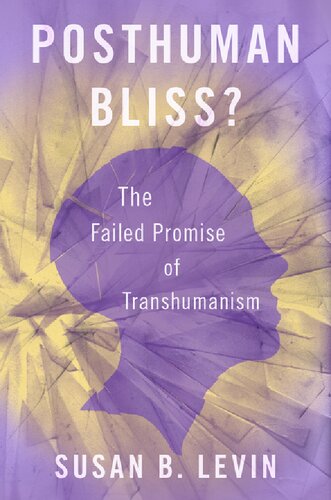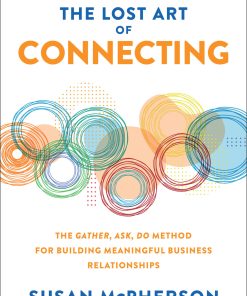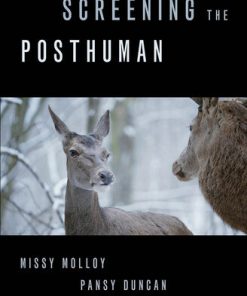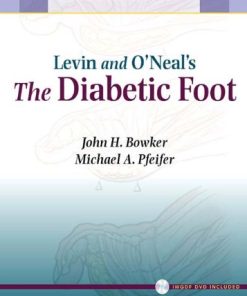Posthuman Bliss The Failed Promise of Transhumanism 1st edition by Susan Levin 0190051501 9780190051501
$50.00 Original price was: $50.00.$25.00Current price is: $25.00.
Posthuman Bliss? : The Failed Promise of Transhumanism 1st edition by Susan B. Levin – Ebook PDF Instant Download/DeliveryISBN: 0190051501, 9780190051501
Full download Posthuman Bliss? : The Failed Promise of Transhumanism 1st edition after payment.

Product details:
ISBN-10 : 0190051501
ISBN-13 : 9780190051501
Author: Susan B. Levin
“radical” enhancement, urge us to pursue the biotechnological heightening of select capacities — above all, cognitive ability — so far beyond any human limit that the beings with those capacities would exist on a higher ontological plane. For proponents of such views, humanity’s self-transcendence through advancements in science and technology may even be morally required. Consequently, the human stakes of how we respond to transhumanism are immeasurably high. In Posthuman Bliss? The Failed Promise of Transhumanism, Susan B. Levin challenges transhumanists’ overarching commitments regarding the mind and brain, ethics, liberal democracy, knowledge, and reality, showing their notion of humanity’s self-transcendence into “posthumanity” to be little more than fantasy. Uniting philosophical with scientific arguments, Levin mounts a significant challenge to transhumanists’ claim that science and technology support their vision of posthumanity. In a clear and engaging style, she dismantles transhumanists’ breezy assurances that posthumans will emerge if we but allocate sufficient resources to that end. Far from offering theoretical and practical “proof of concept” for the vision that they urge upon us, Levin argues, transhumanists engage inadequately with cognitive psychology, biology, and neuroscience, often relying on questionable or outdated views within those fields. Having shown in depth why transhumanism should be rejected, Levin argues forcefully for a holistic perspective on living well that is rooted in Aristotle’s virtue ethics but that is adapted to liberal democracy. This holism is thoroughly human, in the best of senses: It directs us to consider worthy ends for us as human beings and to do the irreplaceable work of understanding ourselves rather than relying on technology and science to be our salvation.
Posthuman Bliss? : The Failed Promise of Transhumanism 1st Table of contents:
1. Assessing Transhumanist Advocacy of Cognitive Bioenhancement
1. Introduction
2. The (Unsuccessful) Essentialism of Enhancement Critics
3. Transhumanists’ Rational Essentialism: An Avowed Enlightenment Legacy
3.1 Transhumanists’ Rational Essentialism
3.2 As We Augment Reason, We Should Eliminate Negative Affect
4. The “Cognitive” in “Cognitive Enhancement”: Its Meaning and Backdrop
5. Why Are Transhumanists So Confident That Cognitive Enhancement Is Upon Us?
6. Hoisting Transhumanists by Their Own (Mental) Petard
6.1 Experimental Results Problematize the View That Cognitive Enhancement Actually Occurs
6.1.1 Cognitive Tradeoffs
6.1.2 Baseline-Dependent Effects
6.1.3 Creativity
6.2 Improvements May Be to Noncognitive Faculties, with Indirect Boons for Memory and Attention
6.3 Moods and Cognitive Functioning
7. Conclusion
2. Why We Should Reject Transhumanists’ Entire Lens on the Mind and Brain
1. Introduction
2. Basic-Emotion and Dual-Process Approaches to Emotions and the Brain
2.1 Basic-Emotion Theory
2.2 Dual-Process Theory
3. The Superior Lens of Appraisal Theory
3.1 Introducing Appraisal Theory
3.2 Scherer’s Appraisal Theory
4. The Wider Resonance of Scherer’s Theory
5. Aristotle’s Lens on the Mind
5.1 Grounding Aristotle’s Approach to Nonrational Faculties
5.2 Desire and Emotion United as Pathē
5.3 Aristotle’s Doctrine of the Mean and Idea of Psychic Balance
5.4 Strong Emotional Responses Can Be Morally Required
5.5 The Import of Desire, Pleasure, and Pain
5.6 Phusis 1 Carefully Distinguished from Phusis 2
6. The Alignment of Aristotle’s Theory with Contemporary Science
7. Casebeer’s “Neo-Aristotelian” Position
8. Conclusion
3. Evaluating the Debate Thus Far over Moral Bioenhancement
1. Setting the Stage
1.1 Transhumanist Concern with Moral Bioenhancement
1.2 What We Should Fear Most, and Why
2. What, Specifically, Should Moral Bioenhancement Be Directed To?
3. Practical Proof of Concept for Moral Bioenhancement?
3.1 Oxytocin
3.2 Serotonin
3.3 Genetics
3.4 Conclusion
4. Evolutionary Biology, Evolutionary Psychology, and Morality
4.1 Defining “Altruism” and “Cooperation” within Evolutionary Biology
4.2 Persson and Savulescu’s Confusion regarding Altruism
4.3 Persson and Savulescu on “a Sense of Justice/Fairness” and Economic Games
4.4 The Upshot: Persson and Savulescu Fail to Provide Theoretical Proof of Concept for Moral Bioe
5. An Alternate Focus on Erasing Antisociality
5.1 Factors That Propel Persson and Savulescu’s Alternate Focus on Elimination
5.2 A Focus on the Elimination of Negative Affect, with Particular Attention to Akrasia
5.3 Not Being Antisocial Does Not Equate to Being Prosocial
6. Trading Psychological Richness and Freedom for Survival
6.1 The Vanishing of Psychic Complexity, Moral Cultivation, and Freedom
6.2 Avoiding Ultimate Harm Should Not Be Our Governing Priority
7. Conclusion
4. Utilitarian Commitments of Transhumanists and Their Sociopolitical Implications
1. Introduction
2. General Features of Utilitarianism
3. “Health” and “Public Health”: Relating Transhumanism to Wider Trends
4. Transhumanists’ Display of Utilitarian Commitments and Their Sociopolitical Implications
4.1 An Expressly Utilitarian Rationale for Moral Bioenhancement
4.2 Transhumanists’ Broader Suggestion That We Should See, and Thus Value, Bioenhancement in the L
4.3 Procreative Decision-Making: A Utilitarian Defense of Maximal Capacitation and Its Sociopoli
5. Resource Allocation
6. The Moral Permissibility of Using Reproductive Technologies to Avoid Disease and Disability
7. Conclusion
5. Creating a Higher Breed: Transhumanism and the Prophecy of Anglo-American Eugenics
1. Introduction
2. The Need for a Fuller Assessment of Transhumanists’ Claims about Earlier Eugenics
3. Human Agency Creates, Then Becomes, the Divine
4. Our Elevation with Respect to “Non-Disease” Conditions
5. In Tandem, Eliminate the Allegedly Deleterious
6. The Great Wingspan of Public Health
7. Shared Utilitarian Commitments
8. Sociopolitical Commitments and Implications
9. Conclusion
6. Transhumanists’ Informational View of Being and Knowledge
1. Introduction
2. A Historical Foray
2.1 McCulloch and Pitts on Nervous Activity
2.2 Shannon and Information Theory
2.3 von Neumann and Cellular Automata
2.4 Wiener and Cybernetics
2.5 Watson and Crick’s Discovery of the Double Helix
2.6 Crick’s Central Dogma
2.7 Deciphering the Genetic Code
2.8 Biology as an Information Science?
3. Persistence, Problems, Pitfalls
4. Kant versus Transhumanism
5. Conclusion
7. Living Virtuously as a Regulative Ideal
1. Introduction
2. Ancient Greek Ethics
3. We Need Not Be Made to Care about Virtue
4. What Now?
5. What Now? Part Two: Our Civic Scene
6. Perfectionism Suitable for Human Beings: Living Virtuously as a Regulative Ideal
7. Conclusion
People also search for Posthuman Bliss? : The Failed Promise of Transhumanism 1st:
posthuman bliss
posthuman abomination
philosophy of transhumanism
transhumanism/posthumanism
plasmatique posthuman
Tags: Posthuman Bliss, Failed Promise, Transhumanism, Susan Levin
You may also like…
Science Fiction - Fantasy Fiction
The Promise of Lost Things 1st edition by Helene Dunbar 1492667414 9781492667414
Business & Economics - Responsibility and Business Ethics
The Lost Art of Connecting 1st edition by Susan Mcpherson 1260469891 9781260469899
Business & Economics - Mathematical Economics
Politics & Philosophy - Social Sciences
Politics & Philosophy - Social Sciences
The Maternal Imagination of Film and Film Theory 1st ed. Edition Lauren Bliss
Uncategorized
Business & Economics - Responsibility and Business Ethics
Uncategorized












